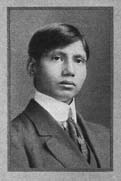Jogesh Chander Misrow
|
|
|
"The Tyee: the Book of the Class of 1912" Vol. X11, 1911 p.334 |
Jogesh Chander Misrow was born in 1886 or 1889 in Calcutta1. It is not known for certain when he came to the United States, but like fellow UW student Taraknath Das he worked as an interpreter with the U.S. Immigration and Naturalization Service. While in INS employ between 1910 and 1914 he attended the UW and was active in the campus Cosmopolitan Club and the Hindustan Club. Earning a B.A. from the College of Arts and Sciences in 1913, Misrow migrated to the Bay Area where he earned an M.A. at Stanford. In his thesis entitled “East Indian Immigration on the Pacific Coast” Misrow discussed the reasons for immigration and the agitation in Canada and the western U.S. for exclusion of East Indian immigrants. He took pains to refute “the alleged [economic] menace” such immigration posed, countering each of the charges asserted by anti-immigration forces – charges that have a surprisingly contemporary ring:
“It is often charged that the coming of East Indians to the United States presents an economic menace. Such an alleged menace might assume the following broad aspects:
a. As an economic burden on the public purse, by becoming paupers, indigents, public charges requiring maintenance, as inmates of insane asylums, penitentiaries and reformatories.
b. As an economic menace to American labor causing unemployment by unequal competition.
c. As a menace to the national wealth, according to the Economic-drain theory. [Note: This theory maintained that the regular remittances immigrants sent to families at home constituted a drain on the local economy.]
d. As ‘birds of passage’ not to reside permanently in this country, but to return to their native country after having achieved material prosperity.”2
Addressing issues of assimilation, Misrow noted that the activities of various East Indian immigrant associations indicate “an earnest endeavor to assimilate American ideals, an endeavor which will be the more fruitful the more it evokes a spirit of sympathetic cooperation on the part of the native population of the countries of their adoption.”3 In a final section he proposed a two-pronged solution to the East Indian immigration problem: “restriction in number by agreement, followed by naturalization of those that are here.” His proposals sound exceedingly moderate by today’s standards, and his suggestion that Canadian immigration problems should be addressed in the context of a federated British empire sets him apart from Indian revolutionaries of the day whose goal it was to rid the motherland of the British imperial yoke.
After securing his M.A., Misrow lectured for a time in the Los Angeles area on topics pertaining to Indian culture, before moving to Chicago to pursue a doctorate in foreign affairs. There he self-published a book of romantic poetry, Usha songita: songs of the dawn, in 1919. That same year another title, Soul-quest, also appeared under the name Sri. Jogesh Misrow, “the Brahmin philosopher.” A greater contrast to the revolutionary rhetoric of fellow student Taraknath Das can scarcely be imagined than this poem, “Ode to India”, which appears in Usha songita:
Ode to India
Inde, my Inde, how sweet thy memory!
Dearest land of sacred lores,
Shrine-abode of world-faiths –
Man’s hope of hopes!
…
The maidens of bronze and golden hue
With bee-black eyes, coral lips,
Languourously weave wreathes of Bakula,
In shades of the Taj by the Lotus-lake;
And gaze at the dome of frozen tears –
Token of Love’s triumph o’er Death.
What a Paradise on earth unfolds
To these exiled eyes.
Soul’s worship to Thee,
And the heart’s holiest homage,
Stronger than sword’s sharpest pledge
Are thine and thine own,
Above all the world
For all the time,
All the time, O Inde!4
1. In the 1910 U.S. Census, Misrow’s age is given as 24, implying a birthdate of 1886; in the 1920 census, his age is listed as 31.
2. Jogesh C. Misrow, East Indian Immigration on the Pacific Coast (San Francisco: R and E Research Associates, 1971), 17. This edition is a reprint of Misrow’s original M.A. thesis.
4. Jogesh Chander Misrow, Usha Songita: Songs of the Dawn (Chicago: J. C. Misrow, 1919): 36.
